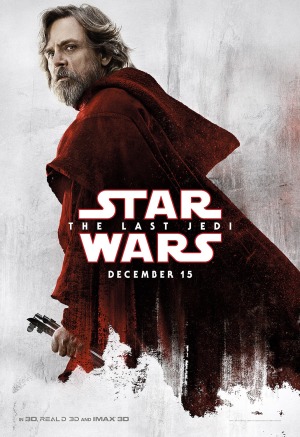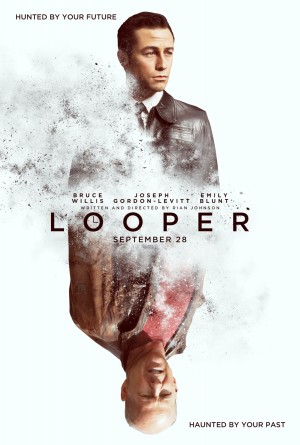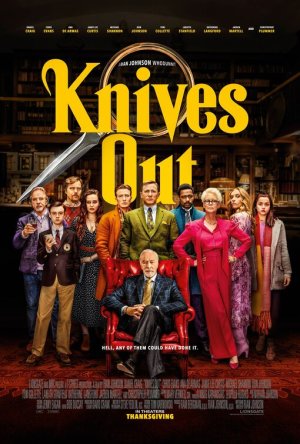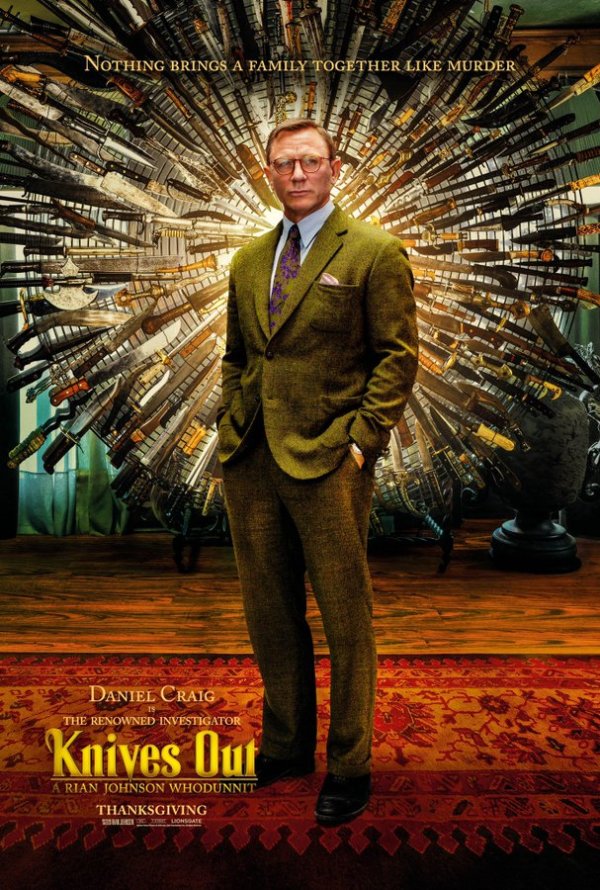![]() BY DAN TABOR Easily one of the most surreal moments I had this year was getting to chat with director Rian Johnson (The Last Jedi, Looper, Breaking Bad) the morning after seeing his latest film, Knives Out, at the Philadelphia Film Festival. Knives Out is a hilariously brilliant whodunit in the spirit of Agatha Christie, that has Johnson tackling the story of an eccentric family under investigation, after the “suicide” of their extremely wealthy, murder mystery-writing patriarch. Johnson immediately made an impression with both filmgoers and critics with his first feature Brick and has since directed both films (Looper) and television (Breaking Bad) that is as thought provoking as it is entertaining, which is no easy task.
BY DAN TABOR Easily one of the most surreal moments I had this year was getting to chat with director Rian Johnson (The Last Jedi, Looper, Breaking Bad) the morning after seeing his latest film, Knives Out, at the Philadelphia Film Festival. Knives Out is a hilariously brilliant whodunit in the spirit of Agatha Christie, that has Johnson tackling the story of an eccentric family under investigation, after the “suicide” of their extremely wealthy, murder mystery-writing patriarch. Johnson immediately made an impression with both filmgoers and critics with his first feature Brick and has since directed both films (Looper) and television (Breaking Bad) that is as thought provoking as it is entertaining, which is no easy task.
Most recently Johnson made the light-speed jump to a galaxy far, far away with the highly divisive The Last Jedi, which led to Rian getting a Star Wars trilogy of his own once the Skywalker saga is laid to rest next month. Johnson was thoughtful, funny and clever as I had expected, and he gave me a brief look into the creative process of Knives Out, while sharing some of his thoughts on his time in the Star Wars universe and his reaction to the most recent Rise Of Skywalker trailer.
PHAWKER: First off congratulations. The film was brilliant, and I hate to sound cliché, but I was on the edge of my seat the entire time.
RIAN JOHNSON: I love the cliché and I will take it.
PHAWKER: So how did you go about channeling your inner Agatha Christie and layering on all these twists and turns, creating this narrative engine that’s very Hitchcock-ian and honed to perfection.
RIAN JOHNSON: Well, you hit it on the head. The whole idea behind it is, you know, it all came from my love of whodunits and wanting to get everything I love about good whodunit in there. But, I also kind of agree with Hitchcock. The whodunit has a big fatal flaw, which is it’s a bunch of clues gathering for one big surprise at the end. So, my intent with this was to put the engine of a Hitchcock thriller in the middle of the whodunit and try and create something that would be more of an empathy driven suspense ride for the audience, but that still has all the pleasures of a whodunit. I still wanted to have the questioning of the family. I still wanted to have a big detective’s denouement at the end. That’s one of my favorite types of scenes in all of fiction. I wanted to do a good one of those. I’m just trying to get everything in there that you love.
PHAWKER: So, the genre you’re dissecting here, it’s definitely shaped by the rogue’s gallery of its ensemble. After you had the script, how much work was put in sort of crafting the characters after the actors who would be inhabiting the roles? Because I know you cast Craig first, but like let’s say when you cast Jamie Lee Curtis, how much did you say, “okay, this would be a good character quirk for her”?
RIAN JOHNSON: A little bit. I mean, there are nuances that they find on the day and there are little things you find with them. But mostly, I mean, they’re fantastic actors, so they’re going to play the character that’s on the page. It wasn’t like, okay, how do I shape this part so its perfect for Jamie. Jamie came in and as an actor and kind of inhabited the role. So, you do at the same time find, with Daniel especially, he and I we’re just emailing references back and forth, figuring out what the accent was going to be and all of the nuances of the character. That’s all stuff that he brought to the table and found and he’s very much creating that person that’s on the screen.
PHAWKER: I really love those little character flourishes, especially with Craig’s accent and Michael Shannon’s limp.
RIAN JOHNSON: [laughs] Yeah, it’s funny. There was a little subplot that we cut out where we explained what’s up with his leg and it just ended, ended up on the cutting room floor, sadly. We’ll put it in the extras. But it works, right. It’s like a Richard III type thing. He’s like got this flaw.
PHAWKER: It ramps up the tension too in that one scene with his cane, tapping it on the floor.
RIAN JOHNSON: Yeah, man. Michael is like, in terms of casting, Michael’s a good example. He’s one of my favorite actors working today, just extraordinary and I feel like I usually see him playing very, strong kind of powerful parts. To me it seemed really interesting, the idea of giving him someone a little weaker to play someone with less of a backbone, kind of the younger brother in the family who sort of is not fully formed — I guess that seemed really interesting.
PHAWKER: You love the desperation in his character. You’re empathetic towards him because of that defect,  because you feel bad for him because everybody else is so successful and yet he’s got the limp and it just kind of makes you…
because you feel bad for him because everybody else is so successful and yet he’s got the limp and it just kind of makes you…
RIAN JOHNSON: Well, and that’s something with whodunits and Agatha Christie books in general, it’s very interesting. In Christie’s books, the typical setup is, there’s a powerful person who is obviously going to be the one that gets murdered and in the first part of her books, your sympathy isn’t very rarely or almost never with that person. Your sympathy is actually with all of these people who are going to be the suspects who all have the motivation to kill that person, because you’re going to identify with each of those motivations. You know, it’s kind of seeing glimpses of like the darker part of yourself in each of these people. Like I can see why they would want to kill that son of a bitch, which is very interesting. So yeah, all of these people you have to end up finding some way, you know, to sympathize with them.
PHAWKER: You’re definitely a fan of the genre. What are some of the checkboxes for you as a fan that you look for coming into a whodunit and what are some of your favorites?
RIAN JOHNSON: Well, I mean, going back to Christy, I mean, I’m a big fan of all of her books. In terms of the movies that they made of her books, the original Death On The Nile and Evil Under the Sun, which had Peter Ustinov playing Poirot. Those hit a real sweet spot for me. Those had kind of an all-star cast. They had a slightly cheeky, self-aware tone that never tips into parody. It’s always still playing it straight. So, for me that was kind of like the target we were sort of aiming for with this, is what those movies felt to me.
The checkboxes are a big fun cast of characters. I love the element of questioning. I love like investigating the past through different perspectives, and that kind of fun. And then I love the big, putting it together scene at the end. Like I said, I’m a sucker for the detective, getting everyone in the room and kind of laying the whole thing out. It feels so satisfying to me. So for me those were kind of like the big things I wanted to hit.
PHAWKER: Speaking of characters, the house itself felt like a character, it was layered with all these, references to Harlan’s books. How much work went into it? Especially the big chair centerpiece with the knives, that even hits at the theme of the film visually. Like how much work went into kind of crafting this world’
RIAN JOHNSON: Quite a bit. I mean, we have, we have an amazing production designer, David Crank who, he’s collaborated with Jack Fisk on [Paul Thomas Anderson’s] movies and Terrence Malick’s movies, he’s an incredible artist. He and his team were tasked with like filling up this house with all that stuff. I gave them the reference of one of my favorite movies, Sleuth from the 1970s, which, is also about a murder mystery writer who has a mansion filled with all his obsessions and yeah, they went to town.
I had written in the script actually, that kind of religious icon made out of knives and Crank’s team found this industrial barbecue grate and like hung all the knives on that. That’s what that thing is actually, you know. When I framed that up, I was like, Oh, that’s pretty cool. It looks like Game of Thrones. I didn’t expect that, but it’s kinda cool.
PHAWKER: It’s like it visually very striking, when I saw the trailer, it just sticks with you.
RIAN JOHNSON: It totally does.
PHAWKER: Yeah and how it’s used in the film, when you have that, what feels like a throwaway line about knives in the beginning and how it then it plays pays off at the end. You’re just like, wow, it comes full circle.
RIAN JOHNSON: It’s a donut. [laughs]
PHAWKER: [laughs] I just loved Craig’s donut monologue in the film, it was so unexpected and hilarious at the same time.
RIAN JOHNSON: We were like part way through filming and somebody referred to it as a knife, donut. I’m like what? And they’re like, yeah, obviously it’s a donut and I was like, oh shit, it is a doughnut. You’re right. I didn’t even think of that.
PHAWKER: [laughs] Now that you mention it. Donuts surprisingly play a big part in Knives Out.
RIAN JOHNSON: Donuts are delicious.
PHAWKER: They are.
PHAWKER: The character of Jacob in your film, who is sort of this alt-right internet troll, it’s hard not to see some of the parallels between him and the kind of folks that were going in on The Last Jedi. Was this your take on the fans thinking The Last Jedi was this sort of anti-Trump statement and that had a problem with its themes of empowerment?
RIAN JOHNSON: No not really. The thing is, sadly, trolldom is not specific to the Star Wars universe. It’s just more someone who is on the internet and is seen in every facet of life online. It’s a segment that is that, hate based trolling. Anyone on the Internet, no matter what waters they are swimming in is going to experience that on some level. So, no, it wasn’t really about specifically tagging that. For me, it was much more about if we’re going to set this movie in 2019 and really, genuinely try and plug into what the culture is today, that’s sadly a big part of the culture and it’s also something that was funny to take the piss out of it.
PHAWKER: yeah, between your film and Jojo Rabbit there are a lot of great films this year that are roasting Nazis and the alt-right.
RIAN JOHNSON: Yeah. We can’t make enough of them, I love that movie, Jojo Rabbit was really good.
PHAWKER: It was definitely one of my favorites this year.
RIAN JOHNSON: Yeah, so good.
PHAWKER: It’s great that directors like you and Taika make these big movies and then they go and make these smaller more personal films. After turning in something like a Star Wars or a Marvel film you then have this creative freedom to do things, I guess a normal filmmaker wouldn’t do because you take some big chances with this amazing cast. Both this and Jojo feel like very sincere passion projects and not your manufactured, sort of like made on demand Hollywood film.
RIAN JOHNSON: That’s good, we’ll see if people come out for it.
PHAWKER: So I’m a Star Wars nerd and I have to ask you a Star Wars question. So the new trailer just came out….
RIAN JOHNSON: Oh my god, so good!
PHAWKER: I have to ask you, you kind of eviscerated the mystery box the Abrams kind of handed off to you. You got rid of Kylo Ren’s mask and showed Adam Driver’s face so he could turn in that amazing performance, you killed off Snoke, and you solved Rey’s parentage and made everyone feel like they could be a Jedi. That was super empowering. What are your feelings on him coming back and kind of walking that back a little bit?
RIAN JOHNSON: How is he walking it back?
PHAWKER: Kylo’s got his helmet back, they replaced Snoke with the Emperor and word is they are once again questioning Rey’s lineage.
RIAN JOHNSON: If I had made IV, I would have given him another helmet. (Laughs) That makes sense story-wise. I don’t see it that way at all. I think the whole notion of that seems a little silly to me is framing it that way. Not to [offend you]……
PHAWKER: No, no, no, we’re both nerds here, let’s discuss.
RIAN JOHNSON: It’s not — people use the word ‘retconning’ or walking something back or whatever. It’s storytelling. Stories move forward. In that way you could argue did Empire retcon A New Hope? Did Return Of The Jedi retcon Empire? If you want to frame it that way, in reality it’s just good storytelling, pushing it forward, that means looping it back. It means doing whatever you have to do to get these people where they are eventually going to end up.
No, I don’t see it that way at all actually. Look I am just loving being a Star Wars fan again.
PHAWKER: Yeah, you’re getting to see it from the outside again.
RIAN JOHNSON: It’s so much fun watching that trailer and just not knowing what’s going to happen and feeling like I get to just show up and watch a Star Wars movie at Christmas. I can’t wait.
PHAWKER: Speaking of that trailer, you’re on the inside, do you know what JJ Abrams fascination is with making weird ass light sabers? Like with Kylo Ren’s and now that weird double bladed one in the trailer.
RIAN JOHNSON: [laughs] Well, I mean there has always been that kind of fun, like with Darth Maul’s double light saber. There is something enjoyable in kind of finding a slightly new.
PHAWKER: A donut of lightsabers in the next one?
RIAN JOHNSON: I’ll take it. [makes light saber donut whooshing sound] You know [Star Wars Rebels director] Dave Filoni did that, and he’s like the spirit of Star Wars. That guy’s amazing, look at the stuff he designed for Rebels that stuff is amazing. I don’t know you got to have fun with it.
KNIVES OUT DIRECTED BY RIAN JOHNSON OPENS THANKSGIVING

